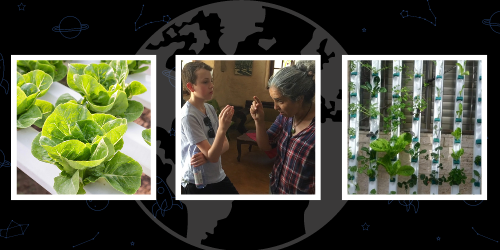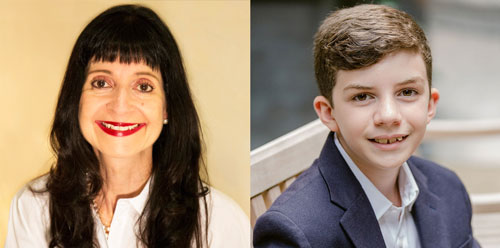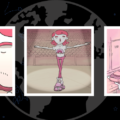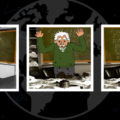Este mes, el público puede filtrar Paz creciente en el Medio Oriente el público puede proyectar A Not So Grand Day Out. This film is curated by the KIDS FIRST! Film Festival for the Planet Classroom Network.
Paz creciente en el Medio Oriente is a film by Director Steven Hoffen, a 7th grader from New York. The award-winning documentary focuses on Sindyanna of Galilee, a farm in Israel where Arab and Jewish women work together closely, cultivating social change as they grow produce in hydroponic gardens. The film documents the non-profit’s efforts, demonstrating the meaningful, ongoing collaboration between Palestinian and Israeli women despite their cultural differences.
La Búsqueda Global para la Educación is pleased to welcome Steven Hoffen.
Steven, Bienvenido. To what degree was this story planned out? Did you stumble upon the Sindyanna of Galilee organization while in Israel, or had you been in contact with them previously?
I went to Israel with my family in the summer of 2019, and we decided to visit the Sindyanna of Galilee after hearing about their excellent work. The staff consists of Arab and Jewish women who share a vision of peaceful coexistence and work towards this goal side by side. We took a tour with the founders, and I was very inspired to see what they were doing.
En el momento, No pensé en hacer una película.; fue cuando regresé a Nueva York, y golpe de COVID, que decidi hacer Paz creciente en el Medio Oriente. El documental me permitió involucrarme y marcar la diferencia en Sindyanna a pesar de la distancia.. También admiro el enfoque de Sindyanna para crear una colaboración árabe-judía., y siento que se puede replicar en todo el mundo.
Me interesa el cine y los derechos humanos.. Tuve una conversación con el Director de Sindyanna, yoav tamir, who explained that the unemployment of Arab women in Israel is due to factories closing and moving. This relates to human rights because a fundamental human right is the “right to work” and “free choice of employment.” In Israel, although many jobs are available, Arab women don’t truly have the opportunity to work since most jobs require more education, education that they did not receive in their childhood.
I made the film during the height of the pandemic. All the interviews were done via Zoom, y luego trabajé en imágenes y detalles a través de la edición en iMovie y Final Cut Pro. fue desafiante, pero estaba muy emocionada de hacer este proyecto ya que me permitió explorar el cine para crear conciencia y ayudar a otros a través de mi trabajo..
La película es ahora una parte de mi misión general para Growing Peace Inc., la organización sin fines de lucro que fundé en 2022. Desde mi viaje a Sindyanna, He estado involucrado en varios proyectos., recaudadores de fondos, e iniciativas. Creciendo paz inc. tiene como objetivo extender los esfuerzos humanitarios y llevar la hidroponía a las escuelas, food pantries, and other organizations that help those in need.
If you had the chance to make a follow-up visit, what progress would you have expected them to make?
I keep in touch with the team at Sindyanna of Galilee, and their progress is impressive. The non-profit is female-led and promotes the concepts of “business for peace” and Fair Trade in Israel, and they have a variety of programs in place.
The hydroponics gardening program is in full swing, and the Arab and Israeli women are growing a variety of organic produce. Because of the film’s impact, 20 more women have joined Sindyanna’s hydroponics project over the past year. Adicionalmente, Sindyanna is introducing hydroponics at the Masar Alternate School, the first experimental alternate Arab/Palestinian school in Israel.
Do you believe projects like this could be viable for solving peace amongst conflicting groups regardless of who they are?
I not only think projects like these are viable, but I also know they are! He visto esto por mí mismo en Sindyanna. El proyecto de hidroponía reunió a mujeres israelíes y árabes., que históricamente han estado en conflicto. Trabajan juntos codo con codo y en unidad para aliviar la inseguridad alimentaria y el hambre y crear igualdad y justicia alimentaria..
Habiendo visto el éxito, Quería llevar este tipo de sistema a otros grupos necesitados. Recaudé fondos para instalar un sistema hidropónico similar en la despensa de alimentos Mesila Lasova en Tel Aviv., Israel, que no es como cualquier otro banco de alimentos ordinario. Abrió a principios de COVID, y su objetivo principal es proporcionar alimentos a los solicitantes de asilo, particularmente aquellos que huyen de lugares como Eritrea y Sudán. No tienen acceso a mucha ayuda del gobierno porque no son ciudadanos..
También estoy haciendo proyectos de tipo similar en áreas de la ciudad de Nueva York., donde las personas de comunidades desatendidas sufren pobreza e inseguridad alimentaria. La creación de un sistema de jardinería hidropónico les da acceso a productos frescos, les permite beneficiarse física y financieramente, y les ayuda a ganar confianza en sí mismos a medida que contribuyen positivamente a la comunidad.
¿Qué imagina en el futuro para la jardinería sostenible y la hidroponía??
Estoy muy involucrado con la agricultura hidropónica., que produce cultivos directamente en agua rica en nutrientes. Espero que la agricultura hidropónica siga creciendo en popularidad y uso.. Hay tantas ventajas de cultivar productos de esta manera. Los vegetales hidropónicos no solo son indistinguibles de los cultivados convencionalmente, pero también ofrecen varias ventajas, such as being healthier and tastier than traditionally grown crops. Además, the way that hydroponics operates has incredible benefits for the environment, such as consuming less water, no soil, and taking up much less space.
Además, gardening provides an abundance of healthy fresh food that is especially important in communities that lack local grocery stores or access to fresh produce. Hydroponic gardening can help create food equality and justice and brings communities together, connecting neighbors and creating green spaces. It can help people save money on groceries, and it’s great to know that the food they eat is not grown with harmful pesticides.
Thank you Steven!
C.M. Rubin and Steven Hoffen
No te pierdas Paz creciente en el Medio Oriente, now screening el público puede proyectar A Not So Grand Day Out. This film is curated by the KIDS FIRST! Film Festival for the Planet Classroom Network.







Comentarios recientes